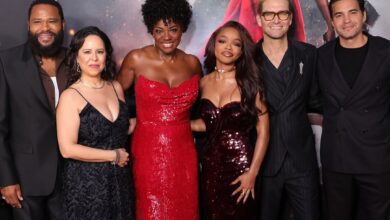Amber Heard guilty: What is the Verdict of Social Networks?
This Wednesday, June 1, the Verdict was Announced in the Case of Depp vs. Heard: Amber Heard was Found Guilty of Defaming her ex-partner, Johnny Depp. We Analyze the Reception of the Verdict and the Trial in Social Networks.

Photo: REUTERS
LatinAmerican Post | Staff
Listen to this article
Leer en español: Amber Heard culpable: ¿cuál es el veredicto de las redes sociales?
We had already been following the Depp vs. Heard trial for 6 weeks. The actress was accused of defaming her ex-partner in a column written for The Washington Post and published in 2018. In that column, Heard described herself as a public figure who represented victims of gender-based violence. This Wednesday, June 1, the jury has given its verdict and has found Amber Heard guilty of defaming her ex-partner.
Depp's case, and what his lawyer focused on, revolved around the damage the Washington Post column had done to his career. The actor was fired, among other productions, from Pirates of the Caribbean. Depp's lawyer also had to prove that, contrary to what the column said, the violence was from Heard towards Depp.
Heard's defense, meanwhile, focused first on showing that the physical abuse described in the column was real; and second, in the fact that the column did not mention Depp, nor was it necessarily about their relationship. This seemed like a plot contradiction that eventually convinced the jury that Heard was guilty of libel.
All this was broadcast on YouTube and court attendance was massive, so what is the verdict of social media?
Teasing Heard on Tik Tok
When it was the actress's turn to testify, the memes and ridiculous videos on Tik Tok did not wait long. In addition, the hashtag #JusticeforJohnnyDepp has been used more than 15 billion times on this social network, while the hashtag #JusticeforAmberHeard has only 51 million views. In court, Depp's support was evident: his fans came every day.
Even if Disney doesn't rehire Depp for Pirates of the Caribbean, his career may get a second chance after the jury's verdict. It is evident, not only in this trial, but also in other televised ones such as that of OJ Simpson, who also drank from the racial tension of Los Angeles in the nineties, that the credibility of a man is greater than that of a woman at least among the fans. Historically, the reputation of men has always been more defended than the word of women. For the sample, the cases of Harvey Weinstein and R. Kelly, which did not go viral until many women accused them. When it has been a single woman, as is the case with Heard, the man's reputation has always found a way to come out intact.
If we add the effect of social networks to this scenario, we have not only a question of credibility, but also of ridicule. It wasn't enough that Heard wasn't generally believed, but that her testimony wasn't even taken seriously on the web to begin with. This, in addition to necessarily influencing what we trust her or not (if we do not take a testimony seriously from the beginning, it is difficult for there to be a disposition to believe), has resulted in a retreading of macho arguments that today seemed from yesteryear. The media and social network users have taken advantage of this situation to renew claims that men can also be victims of domestic violence. Once again we see how an exception, in defense of a man's reputation, serves to make invisible an obvious and widespread problem: gender violence.
Also read: Amber Heard is the mockery of TikTok: What does this say about the macho culture?
Which women do we choose to believe?
On the other hand, the reception on social networks of the Depp vs. Heard also shows that we believe some women and not others. Perhaps because these trials are televised and broadcast on the Internet, and because of the phenomenon that social networks have brought, we have turned celebrities into characters. So we demand that the victim be the perfect victim, that she or he fit the character we have created for them. The aggressor, for his or her part, must also fit into the role of aggressor that we have written.
What the testimonies of both actors, in which both accept problematic drug use and verbal violence towards the other, show is that domestic violence is much more complex than we think.
The verdict: what do Twitter feminists say?
Twitter is perhaps the other social network in which the trial has been commented on the most. In addition, it is the social network in which feminist discussions have taken place in recent years that ask about the issue of gender violence.
In addition to calling attention to how this exception cannot be taken as the rule in order to make invisible the fact that the victims of domestic violence are mostly women, many women have also been seen trilling that "regardless of the verdict", Heard has already been victim of gender violence by receiving so much hate on social media. However, the verdict is not irrelevant: Heard has been found guilty. The evidence (and whether we believe it is the subject of another article), including testimonials from other women (again, who do we believe?), shows that Amber Heard lied. This should matter to us feminists.
That the verdict is irrelevant for some shows that, according to their reading, women can only be victims, we only fit in that role. And even more worrying: that a woman can use the feminist discourse to come out well in a trial (as OJ Simpson would have done before with the anti-racist discourse to convince a jury of her innocence in a case of femicide). This is a patriarchal stunt that should alarm us and is offensive to victims of domestic violence.
The fact that these trials are public should reveal the complexity of gender violence. However, paradoxically, social networks have simplified it to the point where its only reading is that of a villain or villain and a victim. And social networks have already given their verdict.





